Composting
Introduction
Composting is a natural process that involves the decomposition of organic matter by microorganisms, such as bacteria and fungi, into a nutrient-rich soil conditioner. This process is an essential component of the nutrient cycle, and it is widely used in organic farming and waste management.
Overview
Composting is a method of recycling organic waste into a valuable resource for plants and soil. The process involves the decomposition of organic materials, such as kitchen scraps, yard waste, and agricultural residues, by microorganisms under controlled conditions. The end product, known as compost, is a dark, crumbly material that is rich in nutrients and beneficial for plant growth and soil health.


Process of Composting
The composting process involves four main stages: mesophilic phase, thermophilic phase, cooling phase, and maturation phase.
Mesophilic Phase
The mesophilic phase is the initial stage of composting where mesophilic microorganisms, which thrive at moderate temperatures, start to break down the organic materials. This phase is characterized by a rapid increase in microbial activity, which generates heat and raises the temperature of the compost pile.
Thermophilic Phase
As the temperature rises, thermophilic microorganisms, which thrive at high temperatures, take over the decomposition process. The thermophilic phase is characterized by high temperatures, which can reach up to 70°C (158°F), and rapid decomposition of organic materials. This phase also helps to kill pathogens and weed seeds in the compost pile.
Cooling Phase
After the thermophilic phase, the compost pile starts to cool down, and mesophilic microorganisms take over the decomposition process again. This phase is characterized by a slow rate of decomposition and a gradual decrease in temperature.
Maturation Phase
The maturation phase is the final stage of composting where the compost pile stabilizes and matures. This phase is characterized by a slow rate of decomposition, low temperatures, and the production of humus, which is a stable organic material that is beneficial for soil health.
Benefits of Composting
Composting has numerous benefits for the environment, agriculture, and waste management.
Environmental Benefits
Composting helps to reduce greenhouse gas emissions by diverting organic waste from landfills, where it would decompose anaerobically and produce methane, a potent greenhouse gas. Composting also helps to improve soil health and fertility, increase water retention in soil, and reduce soil erosion.
Agricultural Benefits
Composting is beneficial for agriculture as it provides a source of nutrients for plants, improves soil structure and fertility, and enhances soil microbial activity. Composting also helps to suppress plant diseases and pests, and reduce the need for chemical fertilizers.
Waste Management Benefits
Composting is a sustainable method of managing organic waste. It helps to reduce the volume of waste that goes to landfills, and it provides a valuable resource for gardening, landscaping, and agriculture.
Types of Composting
There are several types of composting methods, including backyard composting, vermicomposting, and industrial composting.
Backyard Composting
Backyard composting is a simple and cost-effective method of composting that can be done at home. It involves the decomposition of kitchen scraps and yard waste in a compost bin or pile.
Vermicomposting
Vermicomposting is a method of composting that involves the use of earthworms to accelerate the decomposition process. The worms consume the organic materials and produce worm castings, which are rich in nutrients and beneficial for plant growth.
Industrial Composting
Industrial composting is a large-scale method of composting that is used to manage organic waste from municipalities, industries, and farms. This method involves the use of advanced technology and equipment to control the composting process and produce high-quality compost.
Challenges and Solutions
Composting faces several challenges, such as odor issues, pest problems, and the need for proper management. However, these challenges can be addressed by following best management practices, such as maintaining the right balance of carbon and nitrogen in the compost pile, turning the compost regularly to ensure proper aeration, and using compost bins or tumblers to contain the compost and prevent pests.
